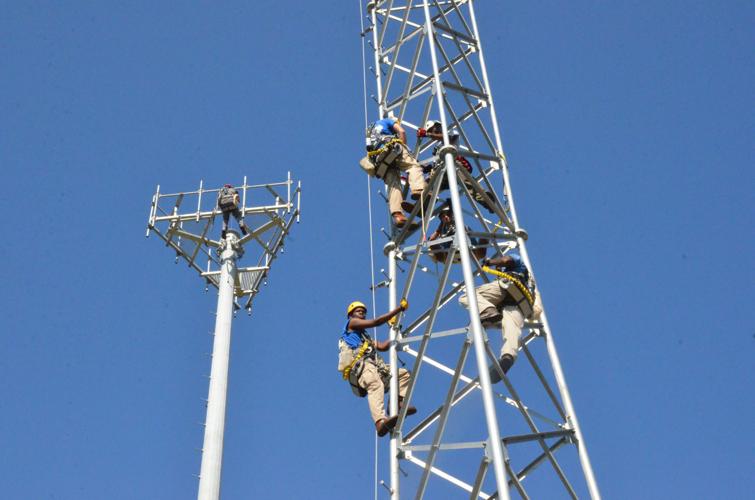GRANITEVILLE — Students in the tower and wireless installation program at Aiken Technical College don't have to work their way up in their field – they start at the top.
On Wednesday, during their first day of hands-on experience on a tower in Barnwell County, they climbed to 200 feet – about 20 stories above the ground. On Thursday, their second day, students and faculty did a climbing demonstration on the two 90-foot towers at ATC's new training facility.
The quick start to what can be a very lucrative career is intentional, said Dr. Raghunath Kanakala, ATC's dean for technical education. Students need to know early if they can work at heights that can reach 400 feet.
“We teach them the safety procedures in class and have a demo tower,” he said. “Once we feel comfortable, we take them to 200 feet. This actually tells them if this what they want to do for the rest of the their lives. We don't wait for the tower climbing as the last part of class. We make them do it immediately and consistently continue doing it.
Aiken Technical College students and faculty members hold a tower climbing demonstration. They climb the recently constructed two 90-foot towers.
“We have a lot of students who say they've climbed mountains,” he continued. “But then they get on the tower and get to 60 feet and see the tower swaying, and they say, oh, mountains don't move – and they get scared. Once they feel comfortable and overcome that fear, it is very easy.”
Working so high up intrigued Matt Magnusom, who moved to the area from Michigan about two months ago with his family. He said he also was looking for “short-term options for a career that pays pretty good.”
After his second day on a tower, Magnusom said the climb was the hard part.
“Going up and down is exhausting,” he said.
The best part?
“The view, for sure,” Magnusom said. “Once you're up there, you can relax.”
The basic level track is a 12-week program that prepares students to for entry-level telecommunications tower technician I positions. The first three weeks are online. Then, students spend nine weeks in the classroom and climbing towers.
Students receive between 25 to 30 hours of climbing time during the basic program, and to graduate, they must demonstrate an ability to climb to at least 280 feet.
ATC also offers an advanced level track, which is self-paced and offered completely online, allowing students to continue their studies while working locally or anywhere in the world. Students who complete the advanced track are prepared for leadership roles such as telecommunications tower technician II positions.
Students who complete both levels earn an Associate Degree in Applied Science with a major in general technology – emphasis in tower and wireless technology.
ATC is the only college in South Carolina that offers a tower and wireless installation program, according to a news release from the college.
Before students graduate, ATC helps students with resumes and job placement, said Nathaniel Hatchett, the project director for the tower program.
Aiken Technical College students and faculty members hold a tower climbing demonstration. They climb the recently constructed two 90-foot towers.
“Once we get the resumes out there, our students get into a working position. All they have to do is be willing to travel,” he said, adding jobs for tower technicians are available around the world.
Right out of school, students can expect starting pay between $15 and $19 an hour, and the industry pays overtime and per diem expenses, Hatchett said.
“You can work anywhere from 50 to 70 hours a week with time and a half for overtime,” he said.
Hatchett said the demand for technicians is “very high” and will continue to grow as technology evolves.
“The technology is always changing, and we're ahead of the curve,” he said. “We're operating now on 4G, but they're getting ready to go to 5G. The personnel who will change that technology out are coming out of these kinds of classes.”
ATC President Dr. Forest Mahan agreed.
“Wireless towers will continue to grow as an industry,” he said. “It's an opportunity for our students to get out into the workforce quickly and make really good money. It's a great high-skill, high-demand job.”
Registration for the next class will begin soon. Classes will begin in January.
For more information, call the Enrollment Services Center at 803-508-7263.







